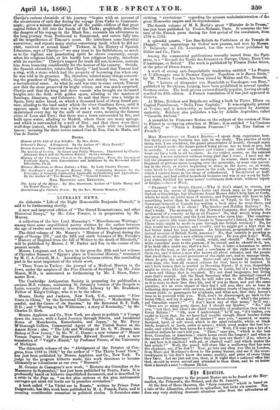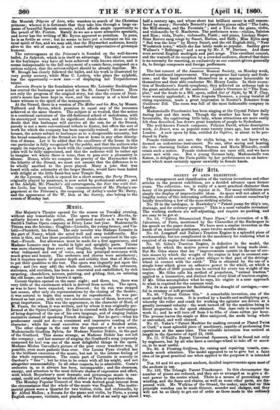ittatrts.
The novelties proper to the present Easter are to be found at the Hay- market, the Princess's, the Strand, and the St. James's. At the first of these theatres, the " fairy romance," which is based on a tale of the Alhambra, abounds in splendour, but lacks via comics- Nor does any very striking dramatic situation arise from the adventures of
the Moorish Pilgrim of Love, who wanders in search of the Christian princess ; whence it is fortunate that they take him through a large ex- panse of beautiful Spanish scenery, which affords ample opportunity to the pencil of Mr. Fenton. Rarely do we see a more attractive spectacle, and never has the writing of Mr. Byron appeared so pointless. In puns, he is as fertile as ever ; but he seems to have put a restraint on his na- tural spirit of fun, and we may add, that the Haymarket audience, keenly alive to the wit of comedy, is not remarkably appreciative of grotesque humour.
The extravaganza at the Princess's is founded on the well-known ballet, La Sylphide, which is in itself an advantage. The chief successes in the burlesque way have all been achieved with known stories and it seems indispensable to the full enjoyment of a comic farce, composed on a serious subject, that the serious subject should be already familiar. Mr. W. Brough has closely followed the ballet, and his work is illustrated by very pretty scenery, while Miss C. Leclerq, who plays the sylphide, has the opportunity —now rare— of displaying her Terpsichorean talent.
Luerezia Borgia is the foundation whereon Mr. Leiceater Buckingham has erected the burlesque now acted at the St. James's Theatre. Here not only the progress of the original story, but also the course of Doni- zetti's music has been kept in view, and the scenery is of a kind that bears witness to the spirit of the management. At the Strand, there is a version of The Miller and his Men, by Messrs. Talfourd and Byron, which promises to equal any of the successes achieved at the same theatre. The subject is so treated, that the action is a continual caricature of the old-fashioned school of melodrama, with its stereotyped terrors, and its significant dumb-show. There is little doubt that this burlesque will survive all the rest, for at the Strand, parody is not a mere conventional tribute to Easter, but offers the sort of work for which the company has been especially trained. At most other houses, the actors submit to burlesque as to a disagreeable necessity, but the broad comedians of the Strand are less at home in any other descrip- tion of drama. Let it be added that the excellence of the house in this one particular is fully recognized by the public, and that the authors who supply its repertory, go to work with the comforting conviction that their jokes will be fully appreciated, and that the audience will be rather apt to imagine wit where there is none, than to pass over a pleasantry in silence. Hence, while we compare the gravity of the Haymarket with the hilarity of the Strand, we must not assume that the difference is to be wholly ascribed to the piece played. Many a joke that was heard with calm solemnity at the larger theatre, would have been hailed with delight at the little band-box near Temple Bar.
At the Lyceum, which is opened for a short season, the Forty Thieves, originally played by amateurs, is now acted by professional artists ; and at the Adelphi, Mr. Planche's old extravaganza, the Fair One with Gol- den Locks, has been revived. The commencement of Mr. Phelps's en- gagernent at the Princess's, the reopening of Asticy's underldr. Batty, and the appearance of Sir W. Don at the Surrey, also belong to the events of Monday last.



























 Previous page
Previous page